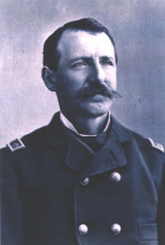Albert Jennings Fountain
| Albert Jennings Fountain | |
|---|---|
 |
|
| 14th Lieutenant Governor of Texas | |
|
In office 1871–1873 |
|
| Governor | Edmund J. Davis |
| Preceded by | David W. Flanagan |
| Succeeded by | Edward B. Pickett |
| President pro tempore of the Texas Senate | |
|
In office 1871 |
|
| Preceded by | David Webster Flanagan |
| Succeeded by | David Webster Flanagan |
| Member of the Texas Senate from the 30th district |
|
|
In office 1870–1874 |
|
| Preceded by | William B. Knox |
| Succeeded by | William H. Russell |
| Personal details | |
| Born |
October 23, 1838 Staten Island, New York City, New York, US |
| Died | disappeared February 1, 1896 (aged 57) Doña Ana County, New Mexico Territory, US |
| Political party | Republican |
| Spouse(s) | Mariana Perez |
| Profession | Journalist, Politician, Attorney, Prosecutor |
| Military service | |
| Service/branch |
Union Army (California Column) 1st Regiment New Mexico Volunteer Cavalry |
| Years of service | 1861–1864 1864–1865 |
| Rank |
2nd Lieutenant (Union) Brevet Captain (Volunteers) |
| Battles/wars |
American Civil War American Indian Wars |
Colonel Albert Jennings Fountain (October 23, 1838 – disappeared February 1, 1896) was born on Staten Island, New York, on October 23, 1838, to Solomon Jennings and Catherine de la Fontaine. He was trained as an attorney and elected to the Texas Senate and the New Mexico Legislature. In 1873, Fountain moved from El Paso to Mesilla with his wife Mariana Pérez Fountain and their five children. He served the Union Army in California and Arizona during the American Civil War and later as a militia officer defending against raiding Apaches. Later, however, he developed a long and supportive history with several tribes, many Mescaleros calling him a friend. In Mesilla, he worked as assistant district attorney and probate judge as well as a newspaper editor, founding, in 1877, the Mesilla Valley Independent and the Spanish edition El Independiente del Valle de la Mesilla. He also founded the Mesilla Dramatic Society and the Mesilla Valley Opera House, now The Fountain Theater, both originally operated by his family. Following a purge of corruption among cattle rustlers, Fountain and his 8-year-old son Henry disappeared near White Sands, New Mexico, where his wagon, stains of blood, and evidence of an ambush were left. Suspicion centered on two rival landowners, Oliver M. Lee and Albert B. Fall. The bodies were never discovered.
Fountain was born on Staten Island, New York, on October 23, 1838, to Solomon Jennings and his wife Catherine de la Fontaine. He went to California as a young man and began calling himself by an Anglicised version of his mother's family name. (Accounts differ as to why he did so.) He studied law in California, and was admitted to the bar in 1860. Working as a reporter for the Sacramento Union, Fountain travelled to Nicaragua in 1860 to cover the filibustering (colonizing) expedition of William Walker. Angering Walker by his reports, Fountain was arrested and sentenced to be shot. However, he escaped and returned to California.
...
Wikipedia
